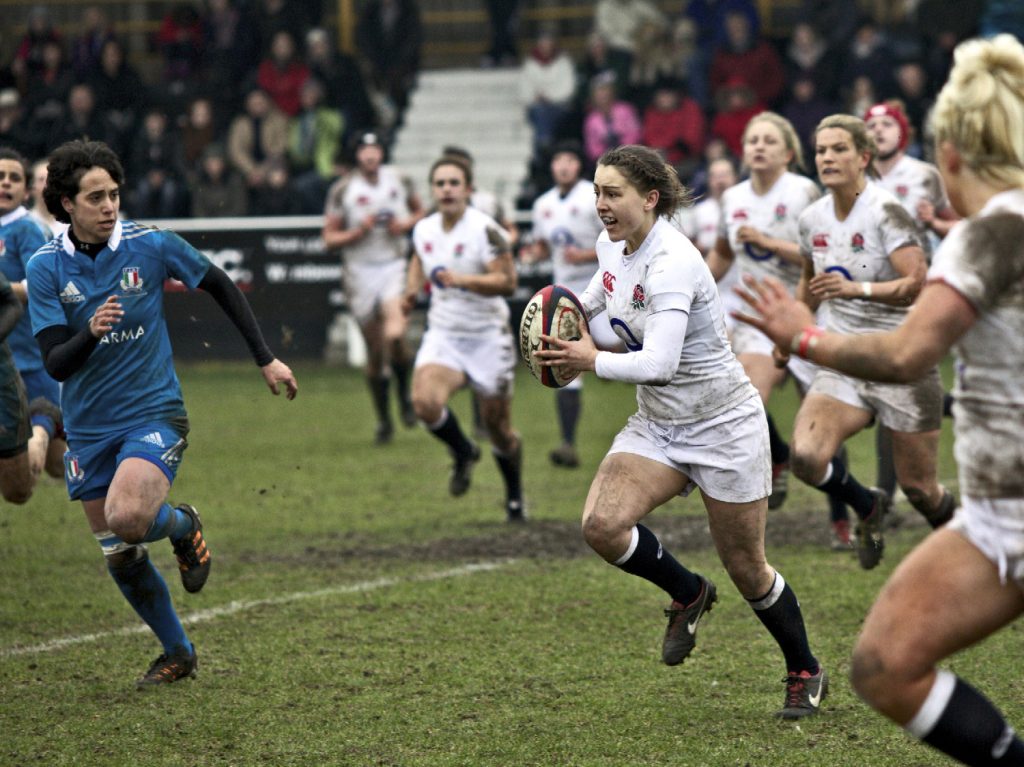To access our unique news archive of over 1,400 articles with insights on over 500+ sustainable sports organisations, join the GSS Network today.
Login here if you are a registered network subscriber.
News article
Red Roses’ Triumph: A Golden Opportunity for English Rugby, But Challenges Loom
England’s phenomenal victory at the Women’s Rugby World Cup has provided a transformative platform for the domestic game, but experts warn that translating this success into sustainable growth is not guaranteed.

The Red Roses’ final win against Canada at Twickenham was witnessed by a sell-out, world-record crowd of 81,885. On television, the match attracted a peak audience of 5.8 million on the BBC, making it the most-watched women’s rugby match in UK history. The tournament as a whole smashed expectations, selling over 440,000 tickets, tripling the previous World Cup attendance record.
However, expert contributors to the Leonard Curtis Rugby Finance Report caution that while this is a landmark moment, the “upside is not automatic” and significant hurdles remain.
Seizing the Moment
According to Gessica Howarth, vice-president of women’s sport investment firm Sphera Partners, the tournament was “a resounding success by every meaningful measure,” feeling “mainstream” rather than a novelty.
“This is the moment to seize attention and leverage the World Cup platform to drive lasting growth,” she said. The key task now is to convert this new audience into “loyal, week-to-week fandom” for the domestic game.
As the Premiership Women’s Rugby (PWR) season kicks off this month, hopes are high for a transformation similar to that seen in women’s football after the Lionesses’ 2022 Euros win. A crucial factor will be the new broadcast deal, which sees all 75 PWR matches broadcast live for the first time. Howarth notes this “removes the biggest historic barrier to growth”. Games will be shown across TNT Sports, the BBC, and YouTube.
“This is the moment to seize attention and leverage the World Cup platform to drive lasting growth. The key task now is to convert this new audience into "oyal, week-to-week fandom for the domestic game."
The Financial Inheritance
Despite the optimism, the PWR faces significant financial challenges, many of which are linked to the men’s game. Eight of the nine PWR teams are connected to men’s Premership Rugby clubs, whose finances are notoriously “stretched thin”.
Howarth states that women’s domestic rugby “operates in the slipstream of a financially stressed men’s game”. This financial fragility was starkly illustrated in the inaugural Leonard Curtis Rugby Finance Report, which found that in 2022/23, seven of the ten men’s Prem Rugby clubs were balance sheet insolvent.
Alex Cadwallader, a Leonard Curtis director, added that “having a sustainable men’s game would help the women’s game immensely”.
"having a sustainable men’s game would help the women’s game immensely".
Risks to Sustainable Growth
This dependency creates specific risks for the women’s league. Howarth highlights a “persistent cost–revenue imbalance”. The costs of wages, medical support, and travel can easily “outrun early-stage income,” which risks “stalled professionalism if models don’t evolve”.
She also pointed to a “double standard on ‘sustainability’,” where the women’s game is “asked to be profitable and tightly cost-controlled far earlier than men’s equivalents were,” an expectation that could cap ambition and investment.
A further threat is the low competitive balance in the sport. Dr Ellie Nesbitt, a senior lecturer at Nottingham Trent University, warns this “risks fan disengagement due to the predictability of the games and results”. At the international level, England and New Zealand have won nine of the ten World Cups. This dominance is mirrored in the PWR, which has had only three different winners since its inception in 2017/18.
“Closing the gap between elite and emerging teams is essential for long-term growth and success,” Dr Nesbitt states.
“Closing the gap between elite and emerging teams is essential for long-term growth and success,”
The Path Forward
To capitalise on the World Cup win, experts agree that the game’s leaders must be strategic. Prof Rob Wilson, co-author of the Leonard Curtis report, believes the success could help move the women’s club game “from dependency on benevolent funding to a more self-sustaining commercial model”.
“This upside is not automatic. Leaders must capitalise on this moment to embed more disciplined fiscal governance... and cost-control mechanisms".
However, he warned: “This upside is not automatic. Leaders must capitalise on this moment to embed more disciplined fiscal governance… and cost-control mechanisms”. He stressed that without addressing underlying “structural weaknesses,” episodic successes like this one often “dissipate”.
Read moreLeonard Curtis
Join the GSS Alliance Partners programme today
Stay ahead of the game with our FREE weekly newsletter, delivering the latest sport and sustainability news from around the globe straight to your inbox
Join the GSS Network programme today
Register for GSS Workshops today
Join the GSS Education programme today






















